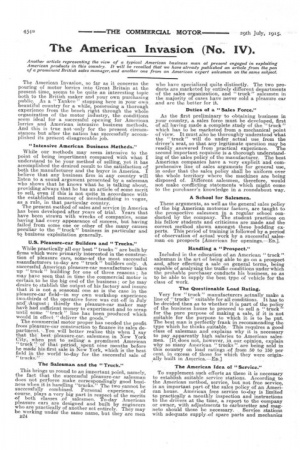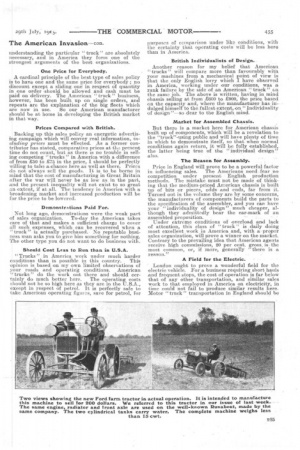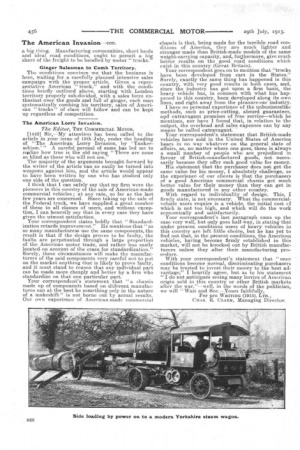The American Invasion (No. IV).
Page 6

Page 7

Page 8

If you've noticed an error in this article please click here to report it so we can fix it.
Another article representing the view of a typical American business man at present engaged in exploiting American products in this country. It will be recalled that we have already published an article from the pen of a prominent British sales manager, and another one from an American expert salesman on the same subject.
The American Invasion, so far as it concerns the pouring of motor lorries into Great Britain at the present time, seems to be quite an interesting topic B both to the ritish maker and your own purchasing public. As a "Yankee" stopping here in your own beautiful country for a while, possessing a thorough experience from the bench right through the whole organization of the motor industry, the conditions seem ideal for a successful opening for American lorries and American intensive business methods. And this is true not -only for the present circumstances but after the nation has successfully accomplished its present disagreeable job.
"Intensive American Business Methods."
While our methods may seem intensive to the point of being impertinent compared with what I understand to be your method of selling, yet it has accomplished the desired result to the satisfaction of both the manufacturer and the buyer in America. I believe that any business firm in any country will listen to a sound argument presented by a salesman who shows that he knows what he is talking about, providing always that he has an article of some merit to sell, even if this is not quite in accordance with the established manner of merchandizing in vogue, as a rule, in that particular country. The present method of sales and service in America has been developed after years of trial. Years that have been strewn with wrecks of companies' some having had every appearance of success, but having failed from some one or other of the many causes peculiar to the "truck" business in particular and to business exploitation generally.
U.S. Pleasure-car Builders and "Trucks.'
While practically all our best " trucks " are built by firms which were primarily interested in the construction of pleasure cars, somesiof the most successful manufacturers to-day are " truck " builders only.
successful American pleasure-car manufacturer takes -up " truck " building for one of three reasons • he may have seen that in time the commercial motor is certain to be the big end of the business ; or he may desire to stablish the output of his factory and insure that it is not a seasonal one as is the case in the pleasure-car field—in my own workshop experience twosthirds of the operative force was cut off in July ancl'eAugust • thirdly the pleasure-car maker may have had sufficient money to experiment and to scrap until some " truck " line has been produced which would in effect "deliver the goods."
, The commercial motor proper has needed the profit from pleasure-car construction to finance its sales department. You will better realize this when I say that the best pleasure-car, salesmen} in New York City, when put to selling" a prominent American "truck ", of that period, spent nine months before he made his-first sale in New York, which is the best field in the world to-day for the successful sale of " trucks."
The Salesman and the "Truck."
This brings us round to an important point, namely, the fact that the successful pleasure-car salesman does not perforce make correspondingly good business when it is handling "trucks." The two cannot be successfully combined. Personal experience, of course, plays a very big part in respect of the merits of both classes pf salesmen. To-day American pleasure cars are designed and built by engineers who are practically of another set entirely. They may be working under the same name, but they are men B24
who have specialized quite distinctly. The two products are marketed by entirely different departments of the sales organization, and "truck" salesmen in the majority of cases have never sold a pleasure car and are the better for it.
Duties of a "Sales Force."
As the first preliminary to obtaining business in your country, a sales force must be developed, first of all having made a complete study of the "truck" which has to be marketed from a mechanical point of view. It must also be thoroughly understood what the " truck " will do under actual use from the driver's seat, so that any legitimate question may be readily answered from practical experience. The second important requisite is a thorough understanding of the sales policy of the manufacturer. The best American companies have a very explicit and comprehensive line of sales arguments for general use, in order that the sales policy shall be uniform over the whole territory where the machines are being disposed of. Different salesmen, therefore, would not make conflicting statements which might come to the purchaser's knowledge in a roundabout way.
A School for Salesmen.
These arguments, as well as the general sales policy of the big American motorcar factors, are taught to the prospective salesmen in a regular school conducted by the company. The student practises on his fellow students and criticisms are made and the correct method shown amongst these budding experts. This period of training is followed by a. period of observation of actual work by a successful salesman on prospects [American for openings.—En.i.
Handling a "Prospect."
Included in the education of an American "truck " salesman is the art of being able to go on a prospect and, after effecting a sale on general terms, being capable of analysing the traffic conditions under which the probable purchaser conducts his business, so as tp be able to supply the best type of vehicle for the class of work.
The Questionable Load Rating.
Very few "truck" manufacturers actually make a line of' trucks" suitable for all conditions. It has to be decided then as to whether it is part of the policy of the business house to proceed to sell a "truck " for the pure purpose of making a sale, if it is not suitable for the purpose to which it is to be put. The best man is perfectly frank in recommending the type which he thinks suitable. This requires a good class of salesman and explains why it is necessary to pay apparently high salaries to American salesmen. [It does not, however, in our, opinion, explain why so Many American "trucks ". are being sold in this country on load ratings of from 50 to 150 per cent, in excess of those for which they were originally built in America.--ED.3 The American Idea of "Service."
To supplement such efforts as these it is necessary to establish suitable service stations. According to the American method, service, but not free service, is an important part of the sales policy of an American house. American free service to-day is limited to practically a monthly inspection and instructions to the drivers at the time, a report to the 'company or owner, with adjustments to carburetter and magneto should these be necessary. Service stations with adequate supply,of spare parts and mechanics
understanding the particular " truck " are absolutely necessary, and in America they formone of the strongest arguments of the best organizations.
One Price for Everybody.
A cardinal principle of the best type of sales policy is to have one and the same price for everybody; no discount except a sliding one in respect of quantity in one order .should be allowed and cash must be id on delivery. The American " truck " business, however, has been built up on single orders, and repeats are the explanation of the big fleets which are now in use. So our American manufacturer should be at home in developing the British market in that way.
Prices Compared with British.
Backing up this sales policy an energetic advertising campaign which will convey real information, including prwee must be effected. As a former contributor has stated, comparative prices at the present time do not count, but as there is no trouble in selling competing "trucks" in America with a difference of from 250 to 275 in the price, I should be perfectly willing to tabs aehance here as well as there. Prices do not always sell the goods. It is to be borne in mind that the cost of manufacturing in Great Britain after the war will never be as low as in the past, and the present inequality will not exist to so great an extent, if at all. The tendency in America with a broadening market and increased production will be for the price to be lowered.
Demonstrations Paid For.
Not long ago, demonstrations were the weak part ol sales organization. To-day the American takes Care of that and makes a sufficient charge to cover all such expenses, which can be recovered when a " truck " is actually purchased: No reputable business man asks yomi to give him something for nothing. The other type you do not want to do business with.
Should Cost Less to Run than in U.S.A.
" Trucks " in America work under much harder conditions than is possible in this country. This opinion is based on my own limited observations of your roads and operating conditions. American "trucks" do the work out there and should cer tainly do much better here. The operating costs should not be so high here as they are in the U.S.A., except in respect of petrol. It is perfectly safe to take American operating figur:.:8, save for petrol, for parpos.es of comparison under like cohditions, with the certainty that operating costs will be less here than in America.
British Individualists of Design.
Another reason for my belief that American "
trucks" will compare more than favourably with your machines from a mechanical point of view is that the only English lorry which I have observed in America, working under our conditions, was a rank failure by the side of an American " truck " on the same job. The above is written, having in mind chassis selling at from 2000 to 1000, the price based on the capacity and, where the manufacturer has indulged himself to the fullest extent, on "Individuality of design "—so dear to the English Mind.
Market for Assembled Chassis.
But there is a market her for American chassis built up of components, which will be a revelation to the "truck"-using public and will have plenty of time in which to demonstrate itself, so that when normal conditions again return, it will be fully established, the latter being true of the "individual design" also.
. The Reason for Assembly.
Price in England will prove to be a powerful factor in• influencing sales. The Americans need .fear no competition under present English production methods. The mistake must not be made of thinking that the medium-priced American chassis is built up of bits or pieces, odds. and ends, far from it. Turned out in the volume they are by some concerns, the manufacturers of components build the parts to the specification of the assembler, and you can have your "individuality of design" much cheaper, although they admittedly bear the ear-mark of an assembled proposition.
Under extreme conditions of overload and lack of attention, this class of " truck " is daily doing most excellent work in America and, with a •proper sales organization, will prove a winner on the market. Contrary to the prevailing idea. that American agents receive high commissions, 20 per cent, gross, is the most common, or, if more, generally there is a reason."
A Field for the Electric.
• London ought to prove a wonderful field for the electric vehicle. For a business requiring short hauls and frequent stops, the cost of operation is far below that of any other transportatien, and similar sales work to that employed in America on electricity, in time could not fail to produce similar results here. Motor " truck " transportation in England should be
a big thing. Manufacturing communities, short hauls and ideal road conditions, ought to permit a big share of the freight to be handled by motor "trucks.'
Ginger Salesman to Comb Territory.
The conditions convince me that the business is here, waiting for a:carefully planned intensive sales campaign with the proper article. Given a representative American truck," and with the conditions briefly outlined above, starting with• London territory properly sub-divided, with a sales force enthusiast ower the goods and full of ginger, each man systematically combing his territory, sales of American " trucks' of class will follow and can be kept up regardless of competition.
The American Lorry Invasion.
TheEditoi-, THE COMMERCIAL MOTOR.
[i443] Sir,-=.MY attention has been called to the article in your issue of 15th July, under the heading of "The American Lorry Invasion, by Yankeeschism.' " A careful perusal of same has led me to railize how true is the oldSaying "There are none so blind as those who will not see."
The majority of the arguments brought forward by the writer of the article can so easily be turned into weapons against him, and the article wouldappear to have been written by one who has -studied only one side of the question.
I think that I can safely say that my firm were the, pioneers in this country of the sale of American-made commercial vehicles ; at any rate, so far as the last few years are concerned. Since taking up the sale of the Federal truck, we have supplied a great number of these to all classes of users, and without exception, I can honestly say that in every case they have given the utmost satisfaction. Your correspondent states baldly that " Standardization retards improvement." He mentions that "as so many manufactures use the same components, the result is that if the design proves to be faulty, the faults are perpetuated through a large proportion of the American motor trade, and rather less easily located on account of the craze for standardization.' Surely, these circumstances will make the manufacturers of the said components very careful not to put on the market anything that is likely to prove faulty, and it must stand to reason that any individual part can be made more cheaply and better by a firm who standardize on that one particular part. Your correspondent's statement that "a chassis made up of components based on different manufactures can at the best be something only in the nature of a makeshift" is not borne out by actual results. Our own experience of American-made commercial chassis is that, being made for the terrible road conditions of America, they are much lighter and stronger made than British-made models of the same weight-carrying capacity, and, fur.thermore, give much better results on the good road conditions which exist in this country (Great Britain).
Your correspondent goes on to mention that "trucks have been developed from cars in the States." Surely, exactly the same thing has happened in this country, with very good results in both cases, and, since the industry has got upOn a firm basis, the heavy vehicle has, in common with what has happened in this country, been developed along its own lines, and right away from the pleasure-car industry. I have no personal experience of the unbusinesslike methods, such as price-cutting, absurd guarantees, and • extravagant promises of free service—which he mentions, nor have I found that, in relation to the output, the overhead and Sales expenses can by any means be 'called extravagant.
Your-correspondent's statement that British-made vehicles have sold in the United States of America bears in no way whatever on the general state of affairs, as, no matter where one goes, there is always asmall number of people who are prejudiced in favour of British-manufactured goods, not necessarily because they offer such good value for money. • His statement that the purchaser does nat get the same value for his money, I absolutely challenge, as the experience of our clients is that the purchasers of a good American commercial chassis get much better value for their money than they can get in goads manufactured in any other country.
With regard to individuality of design. This, I firmly state, is not necessary. What the commercialvehicle users require is a vehicle, the initial cost cf which is not too high, and which will do the work economically and satisfactorily.
Your correspondent's last paragraph sums up the case very well, but only goes half-way, in stating that under present conditions users of heavy vehicles in this country are left little choice, but he has yet to find out that, in the present conditions, the American vehicles, having become firmly established in this market, will not be knocked out by British manufacturers unless they alter their manufacturing procedure.
With your correspondent's statement that " once conditions become normal, discriminating purchasers may be trusted to invest their money to the best advantage," I heartily agree, but as to his statement "I do not anticipate seeing many lorries of American origin sold in this country or other British markets after the war,"—well, in the words of the politician, we will "Wait and See.—Yours faithfully, Per pro 'WHITING 0915), LTD.,
Cuss. H. CLARK, Managing Director.






















